When I started writing Film Festival Secrets, I envisioned it as a much longer tome with a lot of in-depth background about the evolution of festivals, day-to-day life behind the scenes, and many more case studies than are actually in the book as it stands today. When it became apparent that filmmakers didn't need that sort of book half as much as I wanted to write it, I abandoned those plans and created the leaner, more useful manual to the film fest world. I expect that later editions of Film Festival Secrets will include some of those things but for now I want to share some of the "cutting room floor" material with you here on the blog.
This piece was initially written to be an introductory essay or perhaps a section of the first chapter.

One of the most useful weapons in an independent filmmaker's arsenal is a general understanding of the way film festivals work. Few things will gain you more favor in the eyes of a festival director than a familiarity with the annual cycle most festivals go through and your attention to detail when it comes to the peculiarities of that festival. The less time you spend asking questions whose answers are readily available on the festival web site and the more you present yourself as an easygoing soul who is happy to make the festival's job as trouble-free as possible, the smoother the entire process will be for all involved. This is not to say that you should surrender all dignity at the festival door, but the books of festival lore are replete with stories of filmmakers who pestered festival staff with inane queries, displayed a sense of entitlement when their film was accepted, and then complained about the experience afterward. Those stories rarely end with the festival programming that filmmaker's next picture. A little knowledge and a bit of graciousness go a long way.
From the perspective of a filmmaker, the festival process begins with the call for entries. In reality there have been months of preparation leading up to the call -- analysis of the previous festival's successes and failures, reworking of the festival procedures and format, the courting of sponsors, and more. The period between the end of one year's festival and the call for entries of the next is also when staff turnover is likeliest. If you're submitting to a festival for the second (or third or fourth) time, be mindful of the fact that the relationships you established with last year's staff may need to be rebuilt with someone new. By the time they put out the call for entries, this year's staff has already put a lot of thought and work into the upcoming event.
Filmmakers responding to the call for entries fill out the festival's submission form, pay a submission fee (at this writing, anywhere from $20 - $50 and sometimes more), and send one or more copies of their film to the festival for consideration. There are often two deadlines: one "early" deadline with a reduced entry fee and one "final" or "late" deadline, after which no more films are accepted for review. (Though there are sometimes exceptions -- see the chapter on submissions for more.)
As the entries come into the festival, they are sorted by category and catalogued for review. The screening process usually begins as soon as the first films start to trickle in and really gets going as the deadlines approach. Depending on the size of the festival staff and the volume of submissions every film may be viewed by either a staff member or a team of screeners (usually volunteers) may be employed. Each film is viewed by one or more of these screeners (the better festivals make sure each film is viewed at least twice) and evaluated by a standard set of criteria. As the festival dates draw near, the programming team sets aside the best-reviewed films for deliberation and after much internal agonizing, lobbying, and the occasional cage match final decisions are made.
Once the festival decides which films to show the programming team notifies each filmmaker of their acceptance or rejection. As with so many other things in life, the happy news for those films accepted is often delivered first and by personal contact; rejections are usually sent en masse and by form letter. After this comes a flurry of communication and negotiations as filmmakers accept their placement at the film festival or, more rarely, withdraw from the festival. (Believe it or not, there are legitimate reasons not to show your film at a festival after you've been accepted. That's covered that in the chapter on submissions.)
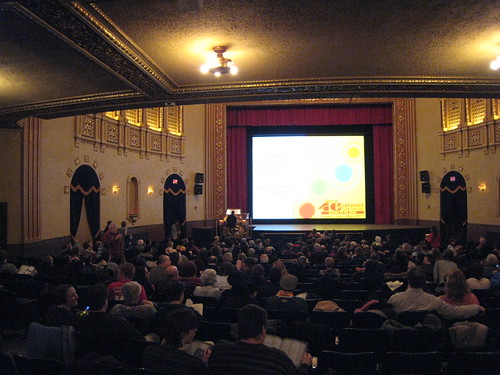
With a program set, the festival staff locks down screening times and puts the finishing touches on the thousands of details that go into a film festival: venues, travel arrangements, the technicalities of projection, print trafficking, party logistics, transportation, the creation of printed and online program guides, volunteers, ticketing, marketing, catering, media relations, and more. Film festivals have branched out from the mere exhibition of movies, offering a bewildering array of parties, panels, speakers, trade shows, seminars, concerts, live animal acts, and other associated events at a multitude of venues. The larger festivals often have a halo of unofficial proceedings during the event, organized by companies and individuals looking to capitalize on the festival's prestige -- and of course the influx of moviegoers and filmmakers.
In the weeks leading up to the festival, the festival staff and filmmakers ramp up their marketing efforts, publishing press releases and sending screeners to local and industry media. Larger festivals often receive preview and on-site coverage from industry publications, but even small festivals will get some coverage from the local press. At this point it's all about selling tickets and putting butts in seats, so the marketing department works overtime to promote the festival program. Savvy filmmakers will start their own marketing campaigns in the festival city, distributing posters and handbills at establishments near the festival venue and seeking coverage from community media to lure film fans to their screenings. This is often the most nerve-wracking time for both filmmakers and festival staff -- making sure everything is going to go off without a hitch (it rarely does) and hollering at the top of their metaphorical and actual lungs to be heard in a world whose collective attention is perpetually fleeting.
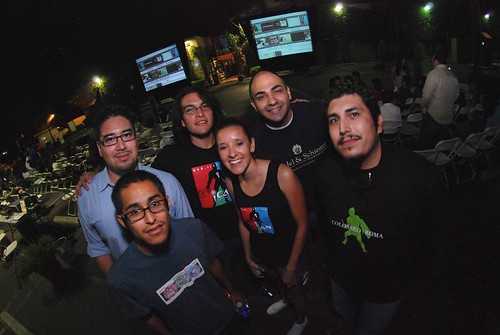
Eventually those final days tick down, however, and it's time for the opening night curtain. (Though sadly, few are the festivals fortunate enough to host their opening nights at theaters which employ actual curtains.) Filmmakers fly in with their marketing materials in hand, business cards in their pockets, and stars in their eyes. And why shouldn't they? Years of work led up to this moment, little of it glamorous, and for many of these no-longer-aspiring cast and crew-members, this is the first significant recognition of the merit of their work from someone other than their family and friends.
This is the point at which filmmaker expectations of a film festival meet reality and disappointment is bound to occur. Relatively few films actually play the well-funded festivals that can afford to fly their contestants in and put them up in lavish hotels; even fewer have the cachet to sell out every film they program. The anticipation of a world premiere with a packed house and an smiling acquisition exec in the crowd, checkbook at the ready, collides with the truth: audiences can be maddeningly elusive, acquisition execs even more so, and film festivals are filled with filmmakers just like you -- hungry, talented, and willing to work, but playing in an ever more crowded field.
This is not to say that film festivals aren't worth your time. Quite the opposite! In the case of many independent films, festivals act as a de facto theatrical tour for those films not destined to achieve theatrical distribution. Film festivals are also the front lines of quality control on the massive glut of independent movies made each year. Without the teams of film festival screeners wading through the sub-standard pictures and heralding the gems that appear, distributors and audiences would have an even harder time finding those unknown filmmakers whose work deserves to be seen. Filmmakers benefit from the festival process even more than the audiences. Not only do they get to see the amazing work of their peers, but they also have a place to showcase their own movies, find their audiences, garner publicity, and -- every so often -- get a real lead on some financial remuneration for their work.
On Monday I'll post part two of this essay, which covers more of the benefits of playing film festivals and some frequently-asked filmmaker questions.
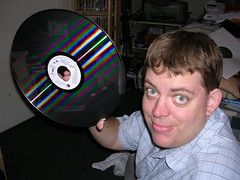 Roger Erik Tinch (art & online director at CineVegas) pens a few thoughts on the future of how we will consume films in the next year and how they'll be delivered to us. Most interesting to me were his thoughts on physical media:
Roger Erik Tinch (art & online director at CineVegas) pens a few thoughts on the future of how we will consume films in the next year and how they'll be delivered to us. Most interesting to me were his thoughts on physical media: 
 Filmmaker and author Heidi van Lier has a new blog over at Film Independent and her first subject to tackle, naturally, is the immortal question: "Why didn't I get into Sundance/Slamdance?"
Filmmaker and author Heidi van Lier has a new blog over at Film Independent and her first subject to tackle, naturally, is the immortal question: "Why didn't I get into Sundance/Slamdance?"







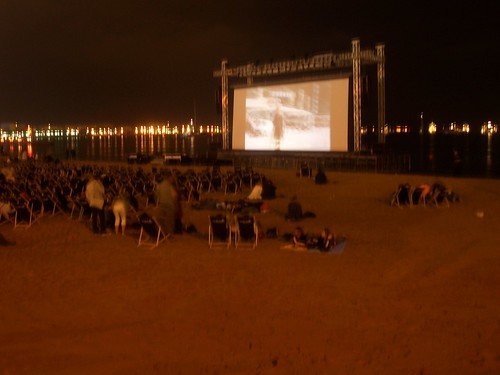




 Austin's premiere film event of the fall begins tomorrow, and with the Austin Film Festival come throngs of filmmaking and screenwriting talent, both emerging and established. It is a sublime mix of the experienced and the impressionable sharing stories, drinks, and a love of cinema. I got my start "on the inside" at the Austin Film Festival; that means it will always hold a special place in my heart. It also means they'll let me do wacky things like launch a book at their fest and moderate a couple of panels in the process. They are:
Austin's premiere film event of the fall begins tomorrow, and with the Austin Film Festival come throngs of filmmaking and screenwriting talent, both emerging and established. It is a sublime mix of the experienced and the impressionable sharing stories, drinks, and a love of cinema. I got my start "on the inside" at the Austin Film Festival; that means it will always hold a special place in my heart. It also means they'll let me do wacky things like launch a book at their fest and moderate a couple of panels in the process. They are:
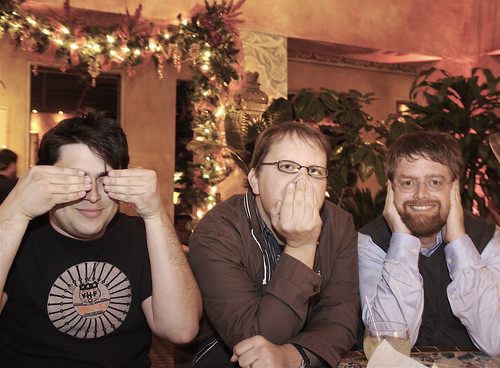


 Peter B. Kaufman and Jen Mohan at
Peter B. Kaufman and Jen Mohan at  As befits a festival that constantly defies expectations but never forgets its small-town roots, the
As befits a festival that constantly defies expectations but never forgets its small-town roots, the 


 This weekend another
This weekend another  Chris Holland has been writing about movies since 1991. In 1996 he co-founded
Chris Holland has been writing about movies since 1991. In 1996 he co-founded 